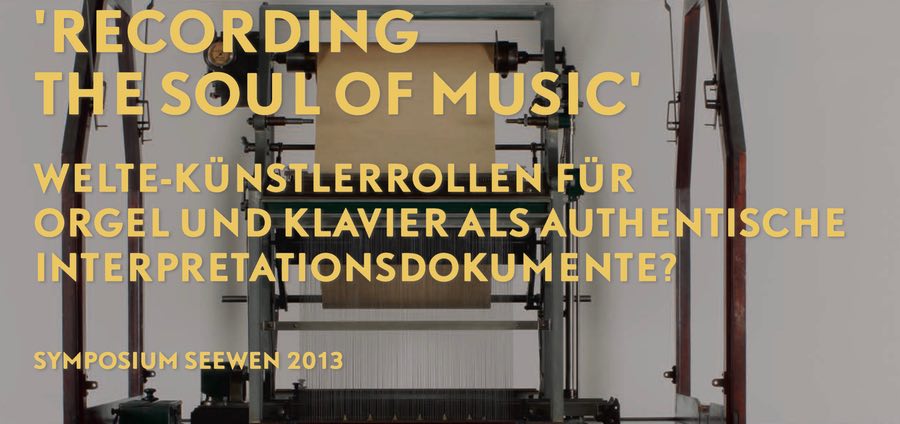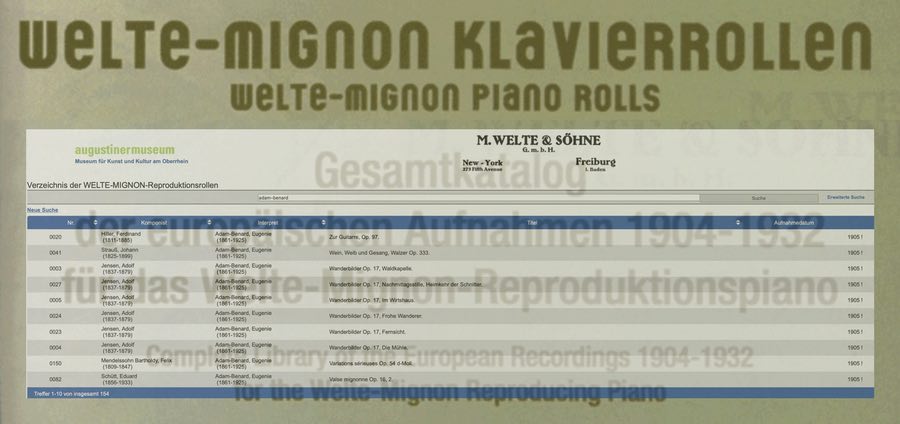Often almost indistinguishable from the original
Why manufacture? Because, just as we did over 100 years ago, we make or have our music rolls and all accessories made by hand. The same applies to digitization. We pack and transport the music rolls ourselves, check and scan each individual roll by hand, and repair defective rolls in consultation so that they can be digitized and thus saved. In a broader sense, data viewing and checking is also done by hand by specialists. Technical aids are and remain only valuable aids.

Our music rolls are unique
All items are based on originals. Due to the high degree of craftsmanship, deviations and production differences can and will occur. Should we make a mistake and slip through the random checks, please contact us directly. Each music roll has a small note at the end with the number and production date - just like Welte used to do.
Like the instruments, boxes and accessories require a constant and constantly monitored room climate (50-60% relative humidity) in order to be protected from damage caused by drying or moisture. During the heating period, additional air humidification and ventilation is usually necessary for instruments and music rolls. Music rolls must be stored in cardboard boxes and wound up neatly. Incorrect handling or defects in the instrument can lead to damage to the music roll, for which we accept no liability. Each roll of sheet music comes with an accompanying note with handling instructions. The good news is that if you ever break a roll, you can send it to us - we will punch the title again and mount it on the existing reel at a special reduced price. We know from eyewitness reports from back then that even then, very popular titles in particular were damaged after some time and were simply bought again.

Every instrument was and is different
Our music rolls are based on the theoretically correct pitch so that they should run well on all instruments of the corresponding type. However, our analyses on various instruments have shown that, for example, Welte's note glide blocks sometimes had significant deviations in pitch and design. Sometimes the holes in the note glide block are of different dimensions in both the wooden and metal versions, which also means that the holes do not cover the entire glide block equally well. This phenomenon also occurs with original Welte music rolls. Provided you have a well-functioning and regulated instrument, please check the dimensions and pitch of your sliding block and the alignment of the playback roll to the recording roll if you have any problems. We can also punch deviating pitches or manually rework rolls if this is necessary for your instrument - however, this involves additional work per roll. Please let us know if you have any problems with the music rolls. Of course, we are also happy to receive feedback if everything goes well.

Tempo is something lively and flowing
Experts are still trying to find out today what the 'right' tempo is for a piece of music, just as the pianists and composers played it in the recordings of the time. Gustav Mahler is said to have said the following on the subject of tempo: "About the far more important thing: about the tempo and completely the overall conception and structure of a work, only desperately little can be determined in this way, because here we are dealing with something living, flowing, which could never, even twice in succession, remain completely the same." (Summer 1895. Gustav Mahler, Im eigenen Wort, Peter Schifferli Verlags AG "Die Arche" Zurich). Welte and Philipps set a fixed 'normal' tempo for the reproduction music rolls, while Hupfeld and others specified a tempo range to be set, e.g. '50-60′ per roll. Nevertheless, Welte and Philipps also provided a tempo lever to make music rolls run up to 50% faster or any slower - depending on personal taste - but certainly also on the daily form of the instruments, which were quite susceptible to weather changes or low usage. So-called setting rolls offer the possibility of adjusting the normal tempo quite precisely - but comparisons of the same pieces of music played by the same pianist on different rolls sometimes show significant differences. Tempo and playing time therefore remain something lively and fluid.

Audibly good results with experience and expertise
Based on the analysis of a large number of original music rolls and discussions with leading experts, we have set limits for production deviations. Our aim is to keep deviations below the audible range. Even with the manufacturers of the time, e.g. Welte, the same titles on different roll copies sometimes showed significant differences in length and punching pattern - even with the scale rolls that are so important for the setting. Our new punchings are always based on what we consider to be the best original roll available to us. We only correct any existing errors in the digitized music roll (e.g. due to ageing, damage, subsequent corrections, production errors, etc.) if this would have a significant effect on the emphasis control without correction (e.g. missing on or off signals). The tones remain unchanged. The photo on the left shows scan sections of two Welte roll copies of the same title superimposed on each other - slight deviations can be recognized.
Production details
Many steps are involved before a music roll is ready for dispatch: Searching and finding the rare titles, digitisation, data processing, punching, testing, making up, and much more. We offer guided tours for customers and researchers by arrangement. Details on production are available on request.

Details on music rolls
Interesting insights into the history of renowned manufacturers such as Welte, Hupfeld, Philipps, Aeolian and Ampico, into technical, contractual and artistic details of music rolls and much more can be found here on the pages of FASZINATIONPIANOLA.
Details on Welte and interpretation research
The activities and results of the "Institut Interpretation Hochschule der Künste Bern" are outstanding when it comes to researching Welte's recording and playback technology. The documentation of the 2013 symposium ("Recording the soul of music") provides numerous insights - definitely worth reading! In 2018, Marc Widuch launched the Global Piano Roll Meetings (GPRM) conference format, in which experts around the world continue to research and discover together.
List of Welte reels
The impressive work of Mr. Schmitz and Mr. Dangel resulted in the first complete Welte music roll catalog. There is also an online database in which all music rolls are listed and can be searched for composers, pianists, pieces of music and more. We have compiled almost complete roll lists for many other roll types such as Hupfeld, Philipps, Empeco etc. and can provide information on details if required.



